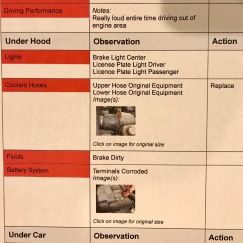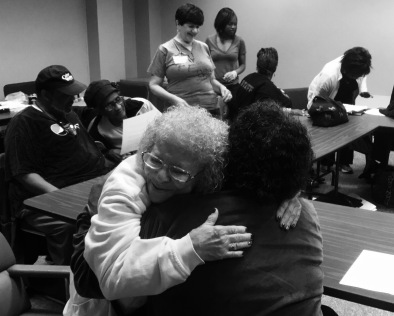I had a revelation… at an oil change station.
In the past when I’ve had the oil changed in my car, I have also received a free “reliability and safety inspection.” The mechanic would take time to explain their 20-point evaluation from windshield wipers to the condition of the tires. Some items would be marked “needs immediate attention,” and others “needs future attention.” The mechanic, of course, would then offer his professional advice hoping to upsell me to purchase additional services.
 The station I recently visited went beyond normal procedure. Within minutes of my oil change, I received a comprehensive inspection report via email, complete with pictures of my truck engine, rusty struts and corroded battery terminals. Later, I also received an email asking me to evaluate their services. I received all these information from just changing my engine oil. I was impressed! I then realized that what I had experienced from a service station could be applied to food distribution ministries to reach the whole person, not just their hunger.
The station I recently visited went beyond normal procedure. Within minutes of my oil change, I received a comprehensive inspection report via email, complete with pictures of my truck engine, rusty struts and corroded battery terminals. Later, I also received an email asking me to evaluate their services. I received all these information from just changing my engine oil. I was impressed! I then realized that what I had experienced from a service station could be applied to food distribution ministries to reach the whole person, not just their hunger.
A Revelation
Rather than just handing out food at food pantries and serving meals at soup kitchens, why not take the time to get to know the people we’re reaching out to so that we can share with them resources that might address other needs they have? Based on my years of experience working with churches and other ministries, the secular world is more astute at gathering and utilizing information to engage the world. One may observe how waitresses, hotel attendants, marketers, software companies and mechanics have mastered the art of information gathering to expand their businesses.
A Tiring Cycle
Recently I spoke with a pastor who was very interested in the missional approach to doing food pantry. What his church is doing just isn’t working. He shared with me that they are running out of money to continue their twice a week food pantry. His few volunteers are getting tired of serving where they see the same people over and over again. He also shared that once a year they do a community service day that includes haircuts, moon walks for kids and a dozen vendors. This annual event attracts 1,500 people, but not without a price that the church absorbs. He later shared that even though they’ve been doing this large outreach for many years, no one has been saved and integrated into the church.
The Norm
For most churches and ministries, it is common to do outreaches that attract lots of people. They prepare for weeks or even months for a day or a week event (I’ve done this many times in the past). They spend hundreds or thousands of dollars for an event. However, there is no follow up system to engage the neighborhoods that they are reaching out to. They miss the information gathering and evaluation portion of the event which is the catalyst to establishing relationships and finding other meaningful ways to reach out.
An Alternative
By gathering and evaluating information, our churches and ministries can serve our communities better. The information we gather will provide us with the information needed to better reach out and offer solutions for needs. For example, at FHL missional food pantries, we provide intake forms that give us vital data about an individual. We get their names, contact info, ethnicity, number of people in their household, their prayer requests (including receiving the Lord or rededication), if they want to volunteer or to join a Bible study and any benefits they currently receive, as well as other information.
If the ministry leaders are diligent in gathering the information and maintaining the system, they will know how to more effectively reach out. For example:
- Equipped with the age groups, a ministry or church could offer VBS or a seniors program.
- By identifying the ethnicity, the ministers could provide ESL or offer Living in America classes.
- The benefits listed could help connect them to other government benefits like SNAP, WIC or Medicare/Medicaid.
- Through evaluating the clients’ prayer needs there can be follow up about answered prayers or new prayer requests given.
- If they receive salvation they can be invited to church or given a list of churches near their homes, or they could be offered discipleship classes.
- The congregation could be taught to do simple follow ups as they receive vital information about a person or a family.
What If…
 What if churches or ministries within the same geographic area gather information on the people in their area and then evaluate and share that information with other ministries? How might that change our neighborhoods?? What meaningful outreaches could arise due to providing tools and valid information to the ministers? What if the information gathered would bring churches and ministers to work together to provide solutions to the challenges of their community? Would there be less crime, involved congregations, healthier and more educated residents and less unemployed people? Would we see more of the Kingdom here on earth?
What if churches or ministries within the same geographic area gather information on the people in their area and then evaluate and share that information with other ministries? How might that change our neighborhoods?? What meaningful outreaches could arise due to providing tools and valid information to the ministers? What if the information gathered would bring churches and ministers to work together to provide solutions to the challenges of their community? Would there be less crime, involved congregations, healthier and more educated residents and less unemployed people? Would we see more of the Kingdom here on earth?
Lesson Learned
 The practices of an oil change station brings us a valuable lesson. They gather, maintain, evaluate and use information to expand their business. We can do the same for Kingdom purposes! Don’t just create an outreach without necessary information and don’t just help people out; go further to build relationships with them. You’ll be surprised what they will tell you. And one more thing, God’s Kingdom is not about wonderful services, exciting events and sophisticated programs, rather, it’s about our relationship with God and with others. That’s what expands the Kingdom of God here on earth.
The practices of an oil change station brings us a valuable lesson. They gather, maintain, evaluate and use information to expand their business. We can do the same for Kingdom purposes! Don’t just create an outreach without necessary information and don’t just help people out; go further to build relationships with them. You’ll be surprised what they will tell you. And one more thing, God’s Kingdom is not about wonderful services, exciting events and sophisticated programs, rather, it’s about our relationship with God and with others. That’s what expands the Kingdom of God here on earth.


